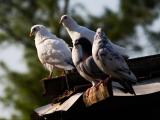Jan 7, 2011
CDC cautions travelers over yellow fever in Uganda
Because of the yellow fever outbreak in northern Uganda, the US Centers for Disease Control and Prevention (CDC) warned Americans yesterday against traveling to the region unless they have been vaccinated against the disease in the past 10 years. The agency recommended vaccination for everyone aged 9 months and older, and noted that Uganda requires the vaccination for everyone from the age of 1 year who arrives from a country with endemic yellow fever. Those who have been vaccinated recently should wait at least 10 days before traveling to the region, to allow time for the vaccine to take effect. The CDC also advised travelers to take steps to prevent mosquito bites. Meanwhile, the European Centre for Disease Prevention and Control (ECDC) this week put the number of cases in northern Uganda at 190, with 48 deaths. The agency said most of the cases are in men between the ages of 20 and 34.
Jan 6 CDC
notice
Jan 5 ECDC statement
South Korea confirms another H5N1 farm outbreak
South Korea today confirmed a new H5N1 avian flu outbreak at a duck farm in Jeolla Province, according to Xinhua, China's state news service. An undisclosed number of birds tested positive on the farm, and 14,000 ducks on the farm plus 70,000 birds at nearby farms were culled to stem the outbreak, the nation's Ministry for Food, Agriculture, Forestry and Fisheries reported. This is South Korea's third H5N1 outbreak since Dec 31 and occurs as the country also battles its worst outbreak to date of foot-and-mouth disease in cattle.
Jan 7 Xinhua story
UN appoints cholera probe panel
The United Nations (UN) announced yesterday that it has appointed a four-member expert panel to explore the source of Haiti's cholera outbreak. In a press release the UN said Secretary-General Ban Ki-moon has been deeply concerned about the outbreak and believes finding the source is important for the UN and the people of Haiti. Some in Haiti contend the outbreak began at a UN peacekeeping base where Nepalese soldiers were stationed, according to previous reports. Cholera illnesses were reported in Nepal at the time the soldiers arrived in Haiti, and the UN base where they stayed is on the Artibonite River, where the outbreak is thought to have started. A few experts who examined the situation have also said there is a strong possibility that the outbreak source might be the UN base. The UN said the expert panel members were selected for their experience in working with cholera. The panel is headed by Dr Alejandro Cravioto, a Mexican citizen from the
International Center for Diarrhoeal Disease Research in Bangladesh. The other members are Dr Claudio Lanata from Peru's Instituto de Investigacion Nutritional, Dr Daniele Lantagne of Harvard University, and Dr Balakrish Nair from India's National Institute of Cholera and Enteric Diseases. The UN said the panel is independent from the UN but will have full access to all UN records, reports, facilities, and staff.
Jan 6 UN statement
Seattle nonprofit gets DoD grant for intradermal flu vaccine
The Infectious Disease Research Institute (IDRI), a nonprofit group based in Seattle, announced today that it has received a grant from two Department of Defense (DoD) agencies to develop a single-dose, adjuvanted, intradermal vaccine for use in a flu pandemic. IDRI spokeswoman Laura Shoemaker told CIDRAP News that the grant, awarded by the DoD's Defense Advanced Research Projects Agency (DARPA) and the Army Research Office, is a 2-year award worth $3,278,982. The group said the vaccine includes adjuvant technology that it developed and a microneedle delivery device. Intradermal administration may improve the immunogenicity of the vaccine and reduce the amount of antigen needed, the institute said, adding that some of its adjuvants have yielded similar benefits. Dr Darrick Carter, IDRI's director of formulations and a principal investigator, said in the statement that the DoD grant will support proof-of-concept preclinical
studies and phase 1 clinical testing.
Jan 7 IDRI press release
Australia spent $200 million on pandemic response
The Australian government spent about $200 million on its response to the 2009 H1N1 pandemic, according to health department documents, the Australian Broadcasting Corp. (ABC) reported today. Health officials provided the data to the government after last year's elections, and a document containing the information was obtained by the media under a freedom-of-information request. The health department spent $131 million on 21 million doses of pandemic vaccine, of which 9 million doses were distributed. Officials weren't able to say how many doses were administered. Authorities planned for a severe pandemic scenario and did not spend an additional $20 million that was available for the government's response.
Jan 7 ABC story



















